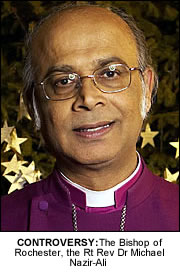 BRITISH Muslims have reacted with fury after a senior bishop of the Church of England accused Islamic extremists of creating “no-go areas” for non-Muslims in Britain.
BRITISH Muslims have reacted with fury after a senior bishop of the Church of England accused Islamic extremists of creating “no-go areas” for non-Muslims in Britain.
The Bishop of Rochester, the Rt Rev Dr Michael Nazir-Ali said some communities were dominated by radical Islam and gave people of other faiths a hostile reception.
prayer and compared intimidation by radical Muslims to far-right extremism.
He writes: “…there has been a worldwide resurgence of the ideology of Islamic extremism. One of the results of this has been to further alienate the young from the nation in which they were growing up and also to turn already separate communities into ‘no-go’ areas where adherence to this ideology has become a mark of acceptability.
“Those of a different faith or race may find it difficult to live or work there because of hostility to them. In many ways, this is but the other side of the coin to far-right intimidation. Attempts have been made to impose an ‘Islamic’ character on certain areas, for example, by insisting on artificial amplification for the Adhan, the call to prayer.”
But his comments were slammed by a number of Muslim groups who accused him of creating “hatred against Muslims”.
Mohammed Shafiq, a spokesman for the Ramadhan Foundation, a Muslim youth group, called on the bishop to resign. “His article is once again an attempt to whip up hatred against Muslims and cause division,” he said.
Ajmal Masroor, spokesman for the Islamic Society of Great Britain, said: “It’s nonsense. It’s a distortion of reality. I believe our communities are far more integrated than they were 10 years ago. If the Church of England had an iota of fairness in their minds they would definitely take serious action.”
Inayat Bunglawala, assistant secretary-general of the Muslim Council of Britain, accused the bishop of scaremongering. “Bishop Nazir-Ali appears to be exercised by what he perceives as the decline in the influence of Christianity upon this country, but trying to frantically scaremonger about Islam and Muslims seems to us to be a rather unethical way of trying to reverse this,” he said.



































